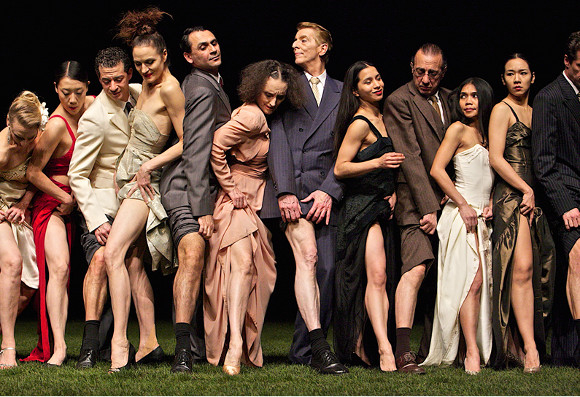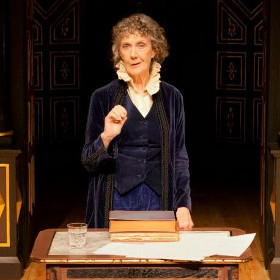Michael Coveney: Pina Bausch and Eileen Atkins make vivid links with the past

© Francis Loney
The late Pina Bausch's great dance theatre company, now known as Tanztheater Wuppertal Pina Bausch, is celebrating its 40th anniversary by bringing one its most unforgettable works, 1980, to Sadler's Wells for just one more week: if you've never seen this piece, you have to beg, borrow or steal to get in.
It's a curiously sad, infuriating, sensual and personal show conceived in the year of the title for 19 dancers (12 female, seven male) shortly after Pina's husband died of cancer; it's a Proustian idyll of lost summers and childhood, a sustained panic attack of growing up, and of social occasions including a hilarious beauty queen contest, everyone squashed on stage together, showing a leg; a sun-bathing sequence in which individual fidgety movements on beach towels laid across a parched lawn stealthily coalesce into a fixed Impressionist-like painting; games and power assertions; a strange tea party, a visiting magician; nationalities expressed in Land of Hope and Glory.
It goes on for well over three-and-half hours but you wouldn't want to miss a minute of it, even the angst-inflamed longeurs of many several of them. Above all, the sheer beauty of how the dancers are moved and placed on the stage and how they elide from one scene to the next is the source of most joy.
There's one particular snake-like routine, which returns several times, in which the company, smiling insouciantly, and progressing through the stage and indeed the front stalls, execute a liquid, rhythmic walk, bending slightly from the waist, hand-jiving and gesticulating the while, in perfect synchronicity, to the recorded accompaniment of a long-forgotten old music hall refrain.
That tune, and that routine, have lodged in my mind, immovably, since I first and last experienced 1980 at the Adelaide Festival of 1982, where the work was presented with two other major early pieces, Kontakthof and Bluebeard, just a few months before the company arrived here for the first time and played in the old Wells.
1980 struck me then as a stand-alone masterpiece, and it still does. I asked a friend, a young director, if she thought the piece was in any way old-fashioned. Not remotely, in fact, exactly the opposite of that, was her response. I suppose that the best of Pina Bausch, like the late work of Janacek, comes into that category of "nothing like it before, and nothing like it since."
The overriding atmosphere is of a poisoned pastoral – there's a stuffed baby deer standing upstage throughout – with the sensational soundtrack including Debussy, Brahms, Elgar and Benny Goodman as well as the melancholic songs of John Dowland, Shakespeare's contemporary, performed by the English countertenor Alfred Deller. The embalmed nature of this music also characterises the historic atmosphere, which is only reinforced by the paradoxical vivacity of the performers, the trivial magic acts, the isolated gymnast and the funny little man playing a wheezy harmonium.
Incredibly, the original 1980 company included three of the dancers now onstage in London: bespectacled, sickly-looking Dominique Mercy, Mechthild Grossman (with hair like Theda Bara's and a voice like a drag queen's) and Lutz Forster, who first worked with Pina B when he was a student in 1975 and who was last year installed as the company's artistic director. It remains to be seen if anyone creates a new piece with the company; the repertoire has not changed since the choreographer died in 2009.

A show which honours the process of memory is also now a memorial to its creator. Something of that spirit, but infinitely jauntier, imbues Eileen Atkins' wonderful solo tribute to Ellen Terry at the new candlelit Sam Wanamaker Playhouse at the Thames-side Globe, simply and appropriately titled Ellen Terry with Eileen Atkins.
Dame Ellen, Henry Irving's leading lady at the Lyceum, took to lecturing about Shakespeare in retirement, and Dame Eileen, simply clad in hose and doublet, Victorian cloak and high ruff collar, streams her considerable wit and wisdom through some stunning renditions of great scenes and speeches, some of them lesser known and notoriously difficult to bring off.
These include Juliet's agitated farewell before taking the sleeping potion, the reunion of Cordelia and King Lear, and the mad scene of Ophelia with which she retires from the stage: "Goodnight, sweet ladies, goodnight…" Terry/Atkins makes penetrative distinctions, beautifully illustrated, between the loveliness of Viola and the wit of Rosalind (whom Irving never allowed her to play) and she is adamant about Beatrice not gaining light laughs in the church scene.
Terry never liked Helena in All's Well (whereas her admiring correspondent George Bernard Shaw thought her Shakespeare's loveliest heroine) and, although she played Beatrice hundreds of times, she never thought she played her quickly enough. The best solo show in town is only 75 minutes long and sold out for its final four performances, but it must surely come back to another stage some time soon. Perhaps it could be paired with Simon Callow's Shakespearean solo?










